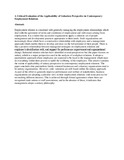| dc.contributor.author | Waiganjo, Esther Wangithi | |
| dc.contributor.author | Nge’the, Jane Muceke | |
| dc.date.accessioned | 2013-02-13T11:36:29Z | |
| dc.date.available | 2013-02-13T11:36:29Z | |
| dc.date.issued | 2012 | |
| dc.identifier.citation | DBA Africa Management Review 2012, Vol 2 No 3, pp 55-68 | en |
| dc.identifier.uri | http://erepository.uonbi.ac.ke:8080/xmlui/handle/123456789/9758 | |
| dc.description | A Critical Evaluation of the Applicability of Unitarism Perspective in
Contemporary Employment Relations | en |
| dc.description.abstract | Employment relation is concerned with generally managing the employment
relationships which deal with the agreement of terms and conditions of employment and
with issues arising from employment. It is evident that successful organizations apply a
coherent set of people management and development practices appropriate to their
needs. Such organizations are increasingly those which have a constructive relationship
with employees and a management approach which enables them to develop and draw
on the full potential of their people. There is thus a positive relationship between
managerial strategies on employment relations and employee’s identification with, and
support for performance improvement and organizational change. Industrial relation
scholars have identified several perspectives but this paper focuses on unitary which is a
major perspective used in the analysis of workplace relations. It adopts a paternalistic
approach where employees are expected to be loyal to the management which must do
everything within their powers to uplift the wellbeing of the employees. This article
examines the extent of applicability of unitary perspective in contemporary employment
relations. The paper concludes that paternalistic family-oriented businesses and
voluntary organizations tend to be unitary organizations. However, wide variations are
still found within the unitary approach. As part of the effort to generally improve
performance and welfare of stakeholders, business organizations are adopting a
pluralist view in their employment relations with some process for reconciling different
interests. This is achieved through formal agreements where there are recognized trade
unions or staff associations, and in the absence of these, it indicates that management
adopts a unitary philosophy. | en |
| dc.language.iso | en | en |
| dc.subject | Unitary perspective | en |
| dc.subject | Employment relations | en |
| dc.title | A Critical Evaluation of the Applicability of Unitarism Perspective in Contemporary Employment Relations | en |
| dc.type | Other | en |

